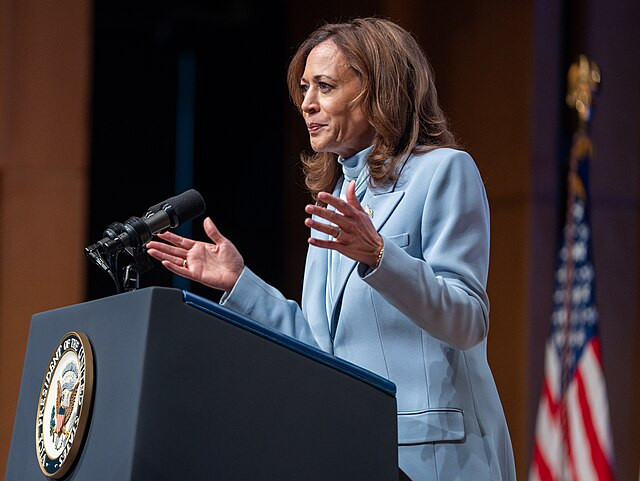Top Democrats in Pennsylvania are raising concerns about Vice President Kamala Harris's campaign strategy in the state, citing a lack of effective outreach and coordination among key party figures. As both Harris and Donald Trump target the battleground state with heavy ad spending, Democratic insiders say missteps could prove costly in the race. The criticism is centered on the campaign's Pennsylvania manager, Nikki Lu, whom some local leaders describe as out of touch with the state's political dynamics.
Ryan Boyer, a prominent labor leader in Philadelphia, voiced his concerns, stating, "I don't think she understands Philadelphia." Boyer, representing a crucial voting bloc, highlights a sentiment echoed by several other Democratic officials in the state, according to The Politico. Over the past few weeks, Harris's campaign has held closed-door meetings with Latino and Black Democratic leaders, seeking to address their concerns over inadequate voter engagement. The meetings reportedly included Harris's deputy chief of staff, Sergio Gonzales, but some participants left unsatisfied with the campaign's approach.
One of the central complaints is the lack of presence at local events and insufficient utilization of influential surrogates, such as Philadelphia Mayor Cherelle Parker. Parker, who campaigned on a tough-on-crime platform and holds credibility with both Black voters and working-class white men, could be instrumental in mobilizing key demographics. Despite this potential, some party members feel her role has been underutilized. Parker responded, affirming her commitment to the campaign and detailing her involvement in various events and interviews.
The Harris campaign, however, remains confident in its efforts. National campaign manager Julie Chávez Rodriguez emphasized the strength of their ground game in Pennsylvania, calling it the "most sophisticated operation in Pennsylvania history." She stated that the campaign has established 50 coordinated offices and hired nearly 400 staffers. The focus has been on targeted advertising, particularly towards Black and Latino voters, with record spending compared to previous Democratic campaigns. Nevertheless, local leaders remain apprehensive, feeling the campaign's approach lacks the nuance needed for effective engagement.
Lu's Pittsburgh background, distant from Philadelphia's influential Black and Latino communities, has fueled further criticism. Democrats argue that her disconnect from the state's southeastern region is hindering voter mobilization efforts. The in-state campaign's newly hired staff has brought some optimism among local leaders, but many worry that these changes may be coming too late. The stakes are high, as both campaigns see Pennsylvania as a pivotal state, and any missteps could tip the balance.
The criticisms also extend beyond Harris's immediate campaign team. Former Philadelphia City Councilmember Maria Quiñones-Sánchez highlighted a broader issue in Democratic politics-an overreliance on data-driven tactics at the expense of cultural sensitivity. She pointed out that while Latino communities respond to personal, energetic outreach, the campaign has focused too much on technical strategies like door-knocking. In her view, this misses the mark in engaging a culturally diverse electorate.
Amidst the growing criticism, other Pennsylvania Democrats defend the campaign's efforts. State Senator Vincent Hughes expressed no complaints and emphasized the need for more resources, not a complete overhaul. Similarly, some in the campaign have taken steps to address the concerns. Paulette Aniskoff, a seasoned strategist from Obama's 2008 Pennsylvania campaign, was recently brought on as a senior adviser, a move some see as an effort to bolster ground efforts and correct past missteps.
However, not all within the party are optimistic. The Latino community's concerns were voiced by former coalition manager Mariel Joy Kornblith Martin, who wrote a memo to state party leaders criticizing the lack of data and infrastructure for Latino outreach. Her memo emphasized the importance of Latino voters in securing a win for Harris in Pennsylvania. The campaign has denied her claims, insisting she was provided the necessary tools.
In response to the internal strife, the Harris campaign has tried to showcase its outreach efforts. They provided examples of high-profile events featuring prominent surrogates like former President Barack Obama and actress America Ferrera. Despite these efforts, some local leaders feel the campaign's messaging still lacks the personal connection necessary to mobilize key demographics effectively.
As Election Day approaches, Democrats in Pennsylvania are increasingly vocal about their frustrations. With millions already spent on advertising and resources deployed across the state, the margin for error is thin. Latino leaders, in particular, stress that any failure to engage their community adequately could have significant repercussions. As one Democratic strategist noted, "We need all hands on deck if we want to win Pennsylvania, and right now, we're not seeing that."
Despite the ongoing concerns, the Harris campaign maintains its focus on Pennsylvania, with new strategies being rolled out. But as the clock ticks, the pressure mounts, and Democrats fear that without immediate action, the state could slip from their grasp, potentially costing Harris the presidency.






